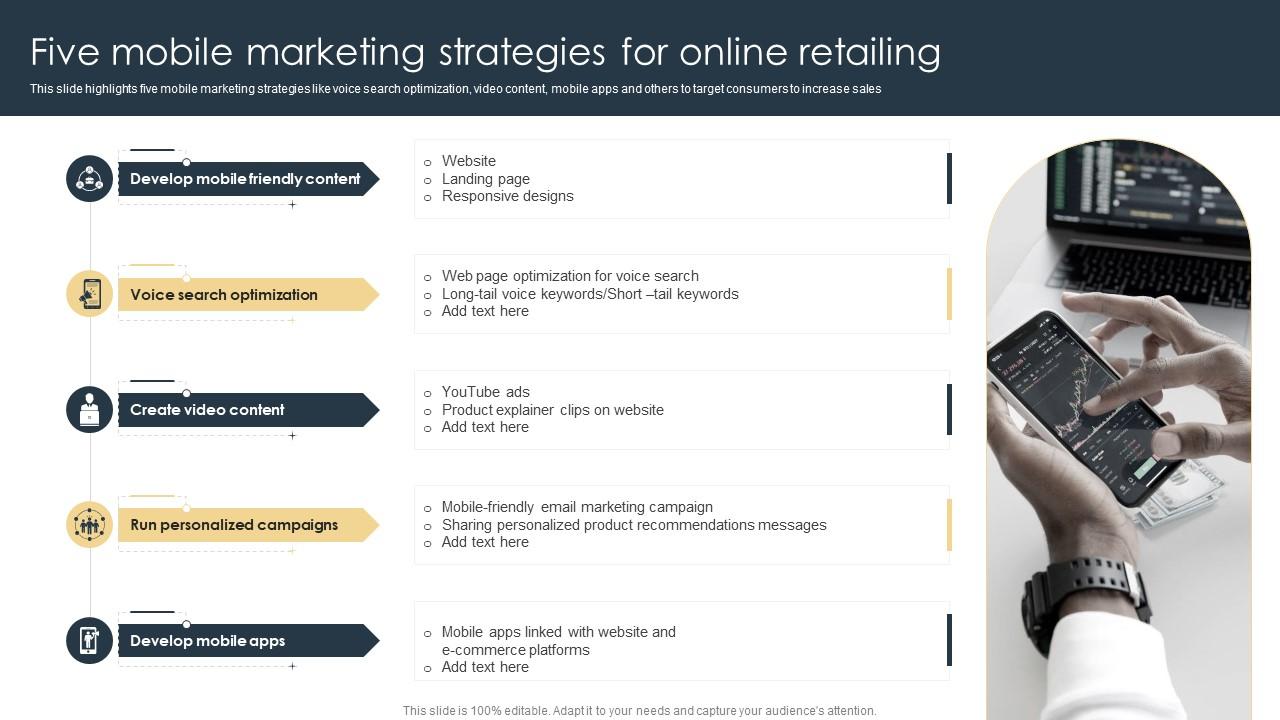Mobile Marketing Strategies For E-commerce Success

Table of Contents
Understanding Your Mobile Audience
Before diving into specific tactics, understanding your mobile audience is paramount. Analyzing their behavior provides invaluable insights for crafting effective campaigns.
- Analyze mobile user behavior: Examine demographics (age, location, gender), purchase patterns (average order value, frequency), device usage (iOS vs. Android), and preferred communication channels (SMS, email, social media). This granular understanding helps tailor your message.
- Use mobile analytics tools: Leverage tools like Google Analytics, Firebase (for apps), and Mixpanel to track key metrics. Focus on bounce rate (percentage of visitors leaving after viewing only one page), conversion rate (percentage of visitors completing a desired action, such as a purchase), and average session duration. These metrics reveal areas for improvement.
- Create detailed buyer personas: Develop profiles representing your ideal mobile customers. Include details about their mobile habits and preferences – what apps they use, how often they check their phones, their preferred social media platforms, and their typical purchase journey on mobile.
- Examples of mobile user behavior analysis tools and techniques: Heatmaps (visual representations of user interaction on your website), session recordings (videos showing user interactions), and A/B testing (comparing different versions of your website or marketing materials to see which performs better).
Optimizing Your E-commerce Website for Mobile
A seamless mobile experience is crucial for converting mobile visitors into customers. This involves several key optimizations:
Mobile-First Website Design
Your website must adapt effortlessly to various screen sizes. Responsive design is non-negotiable.
- Easy navigation: Intuitive menus and clear calls-to-action (CTAs) are essential for effortless browsing.
- Clear call-to-actions: Prominently display CTAs like "Add to Cart," "Buy Now," and "Learn More," ensuring they are easily accessible on all devices.
- Fast loading speed: Slow loading times lead to high bounce rates. Optimize images, minimize HTTP requests, and utilize caching to ensure quick loading.
- Testing on various devices and browsers: Thoroughly test your website's responsiveness on different devices (smartphones, tablets) and browsers (Chrome, Safari, Firefox) to identify and fix any issues.
Mobile App Development (if applicable)
Developing a dedicated mobile app can enhance user experience and engagement, but it's not always necessary.
- Benefits: Personalized experiences, push notifications for promotions and updates, and offline access (depending on the app's functionality) are significant advantages.
- Factors influencing the decision: Consider your budget, target audience's app usage habits, and the complexity of your product offerings. A well-optimized mobile website might suffice for simpler businesses.
Mobile SEO Optimization
Mobile-friendliness is a major ranking factor for search engines. Optimize your site for mobile search:
- Mobile-friendliness: Google's Mobile-Friendly Test tool can help you assess your website's mobile-friendliness. Address any issues highlighted.
- Schema markup and structured data: Implement schema markup to help search engines understand your website's content and display richer snippets in search results.
- Mobile keyword research and optimization: Conduct keyword research specific to mobile searches and incorporate relevant keywords into your website content, meta descriptions, and image alt text.
Leveraging Mobile Marketing Channels
Multiple mobile marketing channels can amplify your reach:
SMS Marketing
Text messages offer a direct and highly effective way to engage customers. Always obtain explicit consent before sending marketing messages.
- Benefits: High open rates, immediate delivery, and the ability to send personalized messages.
- Best practices and legal compliance: Adhere to regulations like the TCPA (Telephone Consumer Protection Act) in the US to avoid penalties.
Social Media Marketing
Platforms like Instagram, Facebook, and TikTok are crucial for reaching mobile users.
- Mobile-optimized content: Create short, engaging videos and visually appealing images optimized for mobile viewing.
- Mobile-specific ad formats: Utilize mobile ad formats like carousel ads and story ads to maximize engagement.
Mobile Email Marketing
Optimize your email campaigns for mobile devices.
- Responsive email design: Ensure your emails render correctly on various devices and screen sizes.
- Mobile-friendly content and subject lines: Keep your email content concise and use compelling subject lines that encourage opens on mobile devices.
Mobile Advertising
Run targeted mobile ad campaigns on platforms like Google Ads and social media.
- Mobile ad formats: Experiment with banner ads, video ads, and in-app ads.
- Mobile-specific targeting options: Utilize location-based targeting, device targeting, and interest-based targeting to reach the right audience.
Measuring and Analyzing Mobile Marketing Results
Continuous monitoring and analysis are crucial for optimizing your strategies.
- Track key performance indicators (KPIs): Monitor mobile conversion rates, click-through rates (CTR), and return on ad spend (ROAS).
- Use A/B testing: Test different versions of your mobile website, landing pages, and marketing materials to identify what resonates best with your audience.
- Regularly analyze data: Use analytics dashboards and reporting tools to track your progress and identify areas for improvement. Refine your strategies based on data-driven insights.
- Examples of mobile analytics dashboards and reporting tools: Google Analytics, Adobe Analytics, and other dedicated mobile analytics platforms.
Conclusion: Mastering Mobile Marketing Strategies for E-commerce Success
Implementing effective Mobile Marketing Strategies for E-commerce Success requires a holistic approach, encompassing audience understanding, website optimization, diverse channel utilization, and rigorous data analysis. By mastering these strategies, you can significantly increase sales, enhance customer engagement, and build stronger brand awareness. Start implementing these Mobile Marketing Strategies for E-commerce Success today and watch your business grow!

Featured Posts
-
 Ufc 313 Star Concedes Opponent Deserved Victory Amidst Robbery Claims
May 19, 2025
Ufc 313 Star Concedes Opponent Deserved Victory Amidst Robbery Claims
May 19, 2025 -
 Vote Now Eurovision 2024 Infe Poll Returns To Esc Today
May 19, 2025
Vote Now Eurovision 2024 Infe Poll Returns To Esc Today
May 19, 2025 -
 March 12 2025 Nyt Mini Crossword Complete Solutions And Hints
May 19, 2025
March 12 2025 Nyt Mini Crossword Complete Solutions And Hints
May 19, 2025 -
 Apprendre Le Metier D Archiviste A Poitiers Formation Et Diplome
May 19, 2025
Apprendre Le Metier D Archiviste A Poitiers Formation Et Diplome
May 19, 2025 -
 The Rise Of Jordan Bardella In French Politics
May 19, 2025
The Rise Of Jordan Bardella In French Politics
May 19, 2025
Latest Posts
-
 L Tzoymis Kai I Enallaktiki Toy Gia To Kypriako O Dromos Toy Kateynasmoy
May 19, 2025
L Tzoymis Kai I Enallaktiki Toy Gia To Kypriako O Dromos Toy Kateynasmoy
May 19, 2025 -
 To Kypriako Zitima Kateynasmos I Antiparathesi I T Hesi Toy L Tzoymi
May 19, 2025
To Kypriako Zitima Kateynasmos I Antiparathesi I T Hesi Toy L Tzoymi
May 19, 2025 -
 Times Kaysimon Kypros Enimeromenos Odigos
May 19, 2025
Times Kaysimon Kypros Enimeromenos Odigos
May 19, 2025 -
 Kypriako I Simasia Toy Kateynasmoy Enanti Tis Antithesis
May 19, 2025
Kypriako I Simasia Toy Kateynasmoy Enanti Tis Antithesis
May 19, 2025 -
 Anazitisi Gia Fthina Kaysima I Kypros Se Arithmoys
May 19, 2025
Anazitisi Gia Fthina Kaysima I Kypros Se Arithmoys
May 19, 2025
